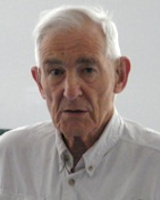
Ian Buist
Biography
John (Ian) Latto Farquharson Buist was born on 30 May 1930 in Dundee to Lieutenant-Colonel Thomas Powrie Buist RAMC, an Army doctor, and Christian Mary Buist, the first woman president of the Students Representative Council at St. Andrews. Ian was a scion of a highly intellectual Scottish family whose legacies formed his core beliefs. In a 2008 interview with Malcolm McBain, he described his grandfather as "a brilliant mathematician, physician and obstetrician, but he subscribed to every rebel cause that he could. He was an early socialist, an atheist, a vegetarian, a eugenicist, and a promoter of Dundee's now heavily-used crematorium". In his developing years Ian embraced Christianity in the Church of Scotland/United Reformed Church, which also helped shape him into a champion of justice and fair play.
Ian received a major scholarship to study at Winchester college. He was called up for national service, but his eyesight was too poor and he was rejected on medical grounds. Then he studied at New College, Oxford (1948-1952) where he earned a double first in classics. He followed this by receiving top place in the civil service exams, giving him the choice of a position in any department. He chose the Colonial Office and soon found himself immersed in the highest levels of government policy-making which remained his métier throughout incarnations in the Civil, Colonial and Diplomatic Service.
Buist advocated enlightened and progressive policies as an adviser to successive administrations in pre-independence East and Central Africa through the 1950s and 1960s. He was one of the chief architects of the policy to remove from white settlers in the highlands of Kenya their legal, but plainly racist, privileges over land ownership and inheritance. He was secretary to a commission investigating the Kenya Police and overhauling its structure, organisation and conditions of service, i.e., to abolish race-based appointments. He constantly sought ways of expanding education, strengthening health infrastructure, embedding the judiciary, broadening democracy, improving water supplies, sanitation and drainage, and empowering indigenous politicians, often by devising subtle schemes to undermine the least savoury aspects of colonialism. These changes helped to pave the way for independence (1963) and a widespread respect among many Kenyans for his role in the transition from colony to statehood. He resided in Dar es Salaam from 1962 to 1969 and retained a deep interest in Kenyan affairs throughout his life.
In 1961 Buist moved to the Economic General Department of the Colonial Office, in the era that gave rise to what became known as Overseas Aid, now International Development. He was among the first to be involved in the formulation of policies which gave rise to co-ordinated global inter-governmental technical and assistance programmes, coinciding with the activities of the World Bank. He found endless stimulation in administering a sizeable budget designed to lift millions out of poverty, alleviate suffering and promote education.
Ian joined the Campaign for Homosexual Equality (CHE) in 1972, a risky move for a government official. Shortly thereafer he became the first senior civil servant to declare his homosexuality openly. He was almost discharged as a consequence, but he survived the "positive vetting" process used in the Civil Service at that time. The ordeal was one of the most stressful of his life since it pitted his honesty and integrity against the prevailing Civil Service code which viewed homosexuals as possessing a “serious character defect”.
Ian was a consistent churchgoer throughout his life, professing to firm "faith without belief". He became a member of the Lesbian and Gay Christian Movement in 1978 and played an active role in the organisation through the years, especially with regard to the Reformed Churches and One Kirk.
Music was also a passion. Buist was an organist for Trinity United Reformed church in Wimbledon, south-west London, and a long-time member of the Thames Philharmonic and Wimbledon Academy choirs. Shortly after starting work in the Civil Service, he began singing in the Colonial Office Choir and sang at the Coronation.
Probably the proudest achievement of his later life came in 1979 when, as an Under-Secretary in the Foreign and Commonwealth Office, he persuaded, almost single-handedly, the First Division Association to support full equality for lesbian and gay people. This put the FDA ahead of many other professional associations. Using his deep sense of fair play and formidable drafting and lobbying skills, he achieved a notable victory against an indifferent, if not hostile, executive.
Ian was in his early fifties when he found his closest life-partner, Dennis Regensburg, whose death eight years later--in 1988--in an accident in Pakistan left Buist desolate. He was honored for his lifetime of dedication to the civil service by being appointed CB in 1990.
In retirement Ian was a board member of Plan International UK for more than twenty years--a perfect outlet for his skills in overseas development and international aid. He persuaded the group to adopt a new focus on girls and women at risk. Also he wrote numerous submissions to government consultations on behalf of the Lesbian and Gay Christian Movement. He wrote letters to The Guardian criticising the Church of England's attitudes to same-sex civil partnerships and defending Peter Mandelson against homophobic attacks in the press following the events that led to Mandelson's resignation in January 2001.
Ian Buist died peacefully, surrounded by a number of friends from around the world and devoted family members, on 19 October 2012.
(Information for this biographical statement taken from an obituary in The Guardian by Neil Buist, an obituary by Richard Kirker on the Peter Thatchell Foundation web site, and a Wikipedia entry.)
Biography Date: March, 2013
Tags
Church of England (Anglican) | Lesbian and Gay Christian Movement (United Kingdom) | United Kingdom
Citation
“Ian Buist | Profile”, LGBTQ Religious Archives Network, accessed March 05, 2026, https://lgbtqreligiousarchives.org/profiles/ian-buist.
Remembrances